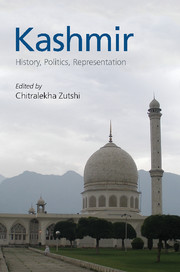Book contents
- Frontmatter
- Dedication
- Contents
- Acknowledgements
- Map 1 Pre-Partition Jammu and Kashmir
- Map 2 Contemporary Kashmir
- Introduction: New Directions in the Study of Kashmir
- PART I HISTORY
- PART II POLITICS
- 5 Azad Kashmir: Integral to India, Integrated into Pakistan, Lacking Integrity as an Autonomous Entity
- 6 ‘Not Part of Kashmir, but of the Kashmir Dispute’: The Political Predicaments of Gilgit-Baltistan
- 7 Law, Gender and Governance in Kashmir
- 8 ‘Survival Is Now Our Politics’: Kashmiri Pandit Community Identity and the Politics of Homeland
- 9 Beyond the ‘Kashmir’ Meta-Narrative: Caste, Identities and the Politics of Conflict in Jammu and Kashmir
- 10 Contested Governance, Competing Nationalisms and Disenchanted Publics: Kashmir beyond Intractability?
- PART III REPRESENTATION
- Contributors
- Index
9 - Beyond the ‘Kashmir’ Meta-Narrative: Caste, Identities and the Politics of Conflict in Jammu and Kashmir
from PART II - POLITICS
Published online by Cambridge University Press: 03 August 2019
- Frontmatter
- Dedication
- Contents
- Acknowledgements
- Map 1 Pre-Partition Jammu and Kashmir
- Map 2 Contemporary Kashmir
- Introduction: New Directions in the Study of Kashmir
- PART I HISTORY
- PART II POLITICS
- 5 Azad Kashmir: Integral to India, Integrated into Pakistan, Lacking Integrity as an Autonomous Entity
- 6 ‘Not Part of Kashmir, but of the Kashmir Dispute’: The Political Predicaments of Gilgit-Baltistan
- 7 Law, Gender and Governance in Kashmir
- 8 ‘Survival Is Now Our Politics’: Kashmiri Pandit Community Identity and the Politics of Homeland
- 9 Beyond the ‘Kashmir’ Meta-Narrative: Caste, Identities and the Politics of Conflict in Jammu and Kashmir
- 10 Contested Governance, Competing Nationalisms and Disenchanted Publics: Kashmir beyond Intractability?
- PART III REPRESENTATION
- Contributors
- Index
Summary
Introduction
In recent years, conflict studies has gained relevance due to its rigorous analysis of prolonged and resilient ethnic, nationalist and political disputes. These studies offer valuable insight into the intricately layered character of such disputes and examine their impact on the everyday lives of people (Spencer, 2007; Bose, 2003; Taras and Ganguly, 2002; Dixon, 2001; Hayden, 1993; Pappe, 1992). Yet, with few exceptions, these works have not sufficiently engaged with sociological and ethnographic perspectives in their interpretation of conflict, since conflict studies still largely operate within the framework of macro political analysis. Scholarship on the Kashmir conflict, for instance, has thoroughly examined the political history of the conflict and the role of the Indian state – immersed in its ideology of hegemonic nationalism – in failing to accommodate the ethnic and political aspirations of Kashmiri Muslims. For all its nuanced and outstanding analysis, the existing scholarship is lacking an in-depth, field-based perspective.
Minute facets of everyday life covered through an ethnographic approach enable us to recognize the diversity in the conceptions of conflict, thereby expanding the meaning of ‘conflict’ itself in ways that go beyond its macro, socio-political interpretations. The ethnographic approach places macro theoretical frameworks of conflict in complex, multiple and localized contexts, thus furthering research in fruitful directions. First, by penetrating deep down, ethnography brings out the diversity of opinions, illustrates how certain interpretations of a particular conflict assume dominance over others and explores other, non-dominant perspectives. Second, through its localized and grounded perspective, ethnography brings out alternative social dynamics that are otherwise masked in the meta-narrative of conflict. For the Kashmir dispute, such field studies can push scholarship beyond its exclusive or singular focus on the territorial aspect of the conflict and place it alongside other everyday social realities – such as caste, class and gender.
In the case of Jammu and Kashmir, the exclusive academic focus of most conflict studies scholarship on the Kashmir region and its incompatible relationship with India trivializes many other issues that do not fit into the mainstream conflict-centred discourse. For instance, many concerns, such as those of Dalits, refugees both from Pakistan-administered Kashmir as well as western Pakistan, and women, all of whom have negligible representation in politics, find scant representation in works on Kashmir.
- Type
- Chapter
- Information
- KashmirHistory, Politics, Representation, pp. 199 - 219Publisher: Cambridge University PressPrint publication year: 2017
- 1
- Cited by



